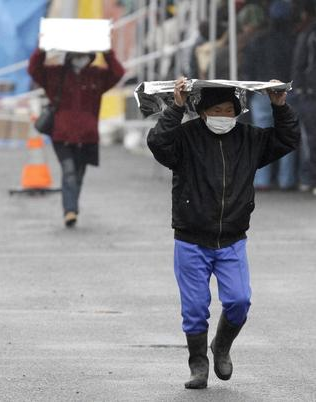Earthquake-induced power cuts, food shortages, and now the intense fear of deadly nuclear radiation has gripped Tokyo, prompting a migration of people 500 kilometres away to Osaka, the third-largest city in Japan.
People in a panicked state are fleeing Tokyo as they worry about the spread of radiation from overheating nuclear reactors in Fukushima, northern Japan, hit hard by the magnitude 9.0 earthquake and tsunami on March 11.
On Wednesday, Japan’s Emperor Akihito appeared for the first-time on television for a rare public message, and he called the earthquake “unprecedented.” He said he was “deeply concerned” about the severity of the nuclear situation surrounding the radiation leaking from Fukushima’s nuclear power plant reactors.
In a sombre tone, the Emperor said: “Each and every Japanese citizen will keep thinking of those who have been affected and continue to oversee the rebuilding process of the region.”
Several decades earlier, the Great Kanto Earthquake of 1923 also led to a mass exodus of residents from Tokyo to Osaka, in central Japan.
Two days after last week’s catastrophic earthquake, Anitaluna Banchero arrived in Osaka after taking a 2.5-hour-long bullet train out of Tokyo, where she works at a school. Banchero, who has lived in Japan for three years, said she booked the next flight out of Japan for her home country of Italy.
“I thought it’s better to leave before everything is blocked, or before another earthquake or more panic,” she said.
In Tokyo, Ms. Banchero said, people had been hoarding food and supplies due to worries about more earthquakes and radiation. Continuous aftershocks – almost 30 quakes rattled Japan on Wednesday, March 16 – also kept Tokyo residents on edge since the disaster struck last week.
“People are starting to feel panic. Everybody is taking all they can from the supermarkets,” Ms. Banchero said. “My friend in Tokyo asked me to send him some bread from Osaka. He said it’s impossible to find any food, since supermarkets are empty.”
Electricity shortage
The earthquake and tsunami also caused a major electricity shortage all over northeastern Japan and around Tokyo, and regional electric companies have scheduled planned power outages in these areas until March 18, 2011. This has led to major disruptions of public transportation in Tokyo, a city that relies on its extensive train and subway system.
The range of problems afflicting Tokyo has also led companies, non-profit groups, and foreign embassies to shift their operations to Osaka.
Satoshi Nakazawa, a program coordinator at the Tokyo-based NGO Peace Boat, said his organisation’s entire staff of 30 people would re-locate from Tokyo to Osaka. “Public transportation is down and we cannot function as usual,” he said. Mr. Nakazawa said the staff were still searching for a place to set up an office in Osaka.
One of the NGO’s employees, Natsusa Yamashita, left Tokyo for Osaka early on Wednesday. Unhampered by the cold weather in Osaka, Mr. Yamashita and a large group of energetic volunteers spent hours collecting donations for earthquake relief efforts outside the city’s central train station.
Increased fears of radiation contamination in the Tokyo area also prompted some airlines to cancel flights in and out of Tokyo or re-route those flights to Osaka.
Alitalia Airlines of Italy shifted its departing and arriving Tokyo flights over to Osaka. Lufthansa moved the airline’s Munich to Tokyo Narita flights to Osaka on Tuesday, March 15, according to the airline’s spokesperson Thomas Jachnow.
“The main reason is to have stable operations,” he said. Lufthansa will decide on Monday whether to revert back to the original flight routing, he added.
Several nations, including France and Australia, have officially urged their citizens to leave Japan quickly, and Air France planned to send extra planes to evacuate people out of the country. India recently pulled Japan-based Infosys employees from Tokyo’s offices and Infosys offered to provide Indian visas to Japanese employees.
While some people have left Japan for good, others said they would return after the threat of radiation has dissipated. Ms. Banchero said she planned to come back to Japan in 20 days, and hoped to resume her normal life in Tokyo in a month’s time.
Read the story on The Hindu newspaper’s website.











